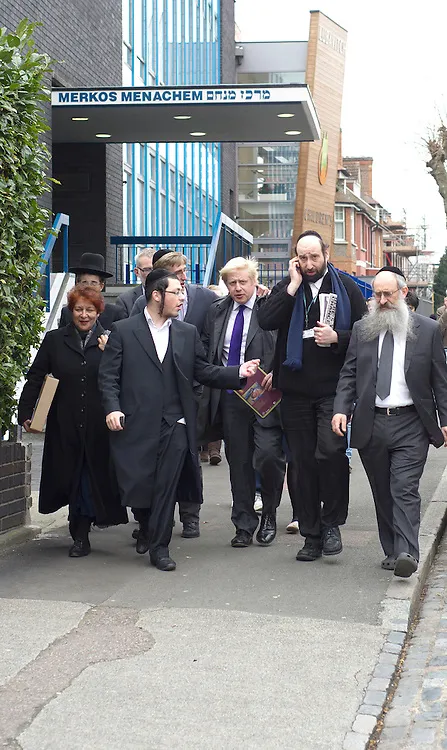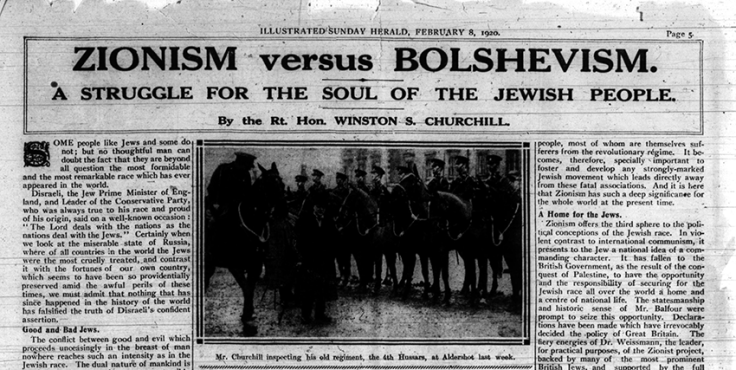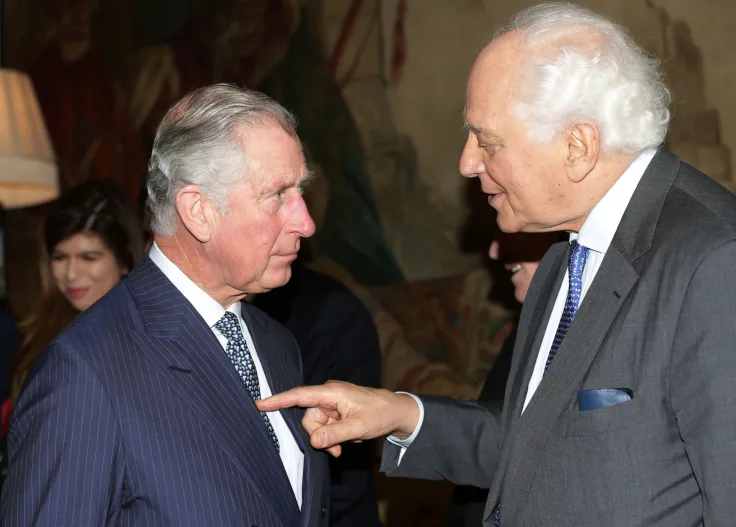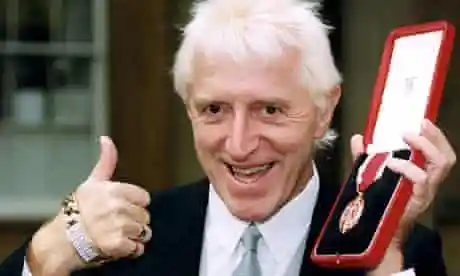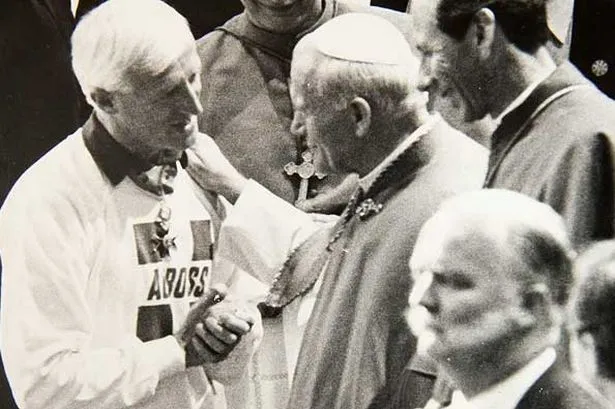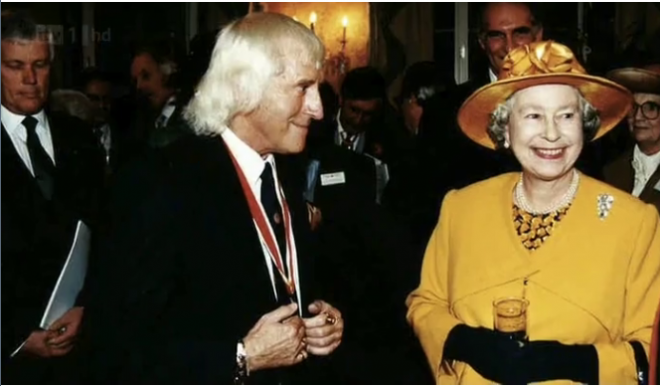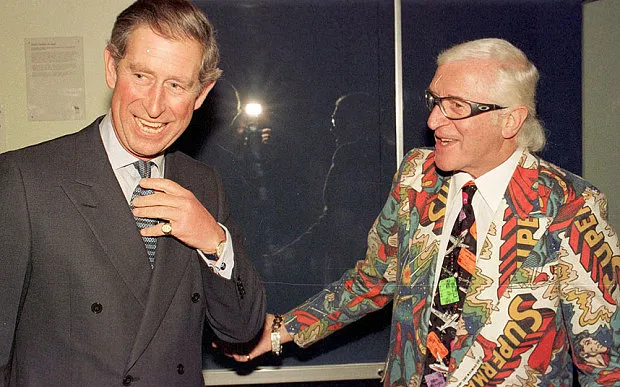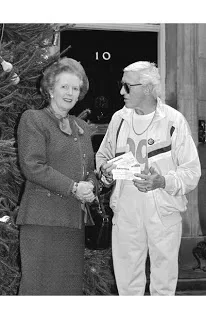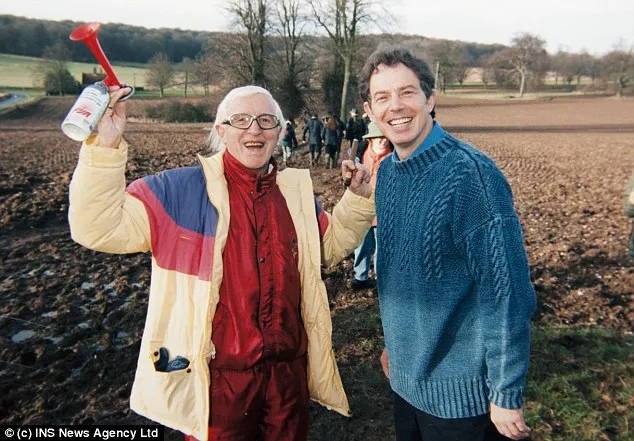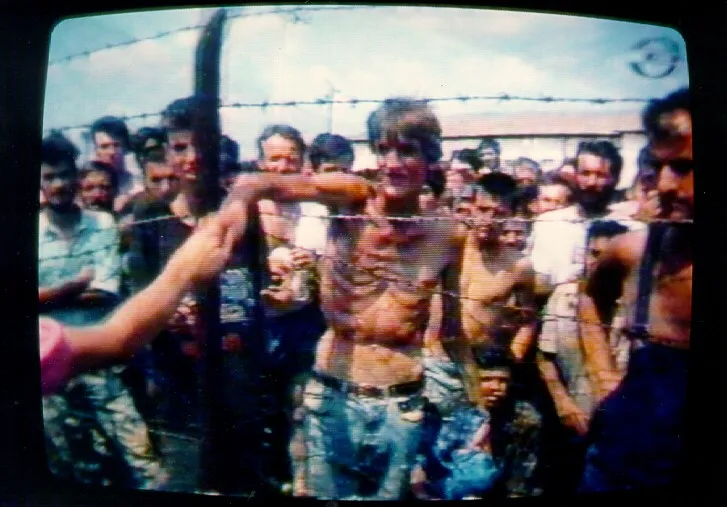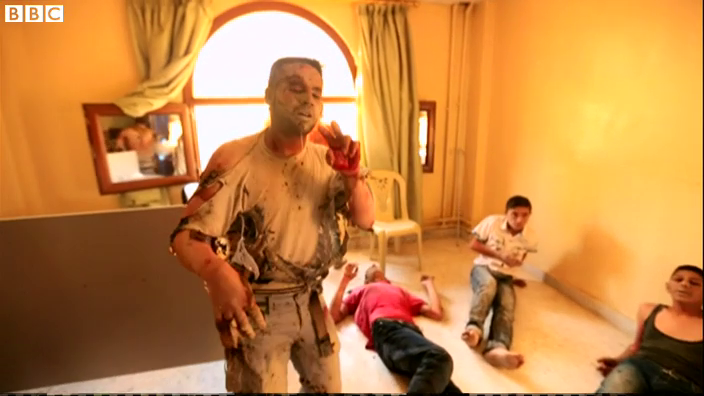British Media and Propaganda
EXPOSURES - EXPOSÉS, 15 Apr 2024
Swiss Policy Research - TRANSCEND Media Service
April 2024 – An Exploration of Modern British Media and Propaganda
Contents: 1. Introduction / 2. Media ownership / 3. Media censorship / 4. Reuters news agency / 5. NGOs and proxy groups / 6. Israel Lobby / 7. Media scandals / 8. Wikipedia / 9. Independent media / 10. Search engines / 11. Simulated terrorism / 12. War propaganda examples
1. Introduction
From World War I to today, the British government and British media have been leading players in the production and dissemination of war propaganda and atrocity propaganda. What began with simple black-and-white cartoons and photo forgeries over a hundred years ago has since evolved into a complex propaganda ecosystem that includes government agencies, proxy groups, sophisticated online manipulation, false-flag attacks, and simulated terrorism.
The following analysis will explore some of the key actors and features of contemporary British propaganda. In addition, the analysis will review some of the most famous cases of British war propaganda and atrocity propaganda, which have shaped recent Western and global history to a significant extent. Finally, the analysis will discuss independent British media, academic groups and online platforms that investigate and challenge modern war propaganda.
Please note that this analysis should not be construed in any way as anti-British.
2. Media ownership
British media ownership is more strongly concentrated than is generally assumed.
Most British newspapers are owned by a few billionaires and media corporations. This includes Rupert Murdoch (The Sun, The Times, The Sunday Times), Lord Rothermere (Daily Mail, MailOnline, Mail on Sunday, Metro, the “i”), the Barclay family (The Daily Telegraph, The Sunday Telegraph, The Spectator), Baron Lebedev (Evening Standard, The Independent), and the Reach media group (Daily Mirror, Daily Express, Daily Star, and others).
The Economist is owned primarily by the British Rothschild banking family and the Italian billionaire industrialist Agnelli family. The Financial Times was owned by British publishing company Pearson until 2015, when it was acquired by Japanese media company Nikkei.
The Guardian and The Observer are owned by the Guardian Media Group (discussed below).
Taken together, Rupert Murdoch’s News Corp UK, Lord Rothermere’s Daily Mail Group, and the Reach media group control about 80% of the national newspaper market. About 60% of total readers in the UK are consuming media owned by one of four British billionaires.
British online news is dominated by three major players which together account for two thirds of monthly visits: the BBC (39%), Reach media (18%), and the Daily Mail Group (10%).
The British television market is dominated by the BBC (31% market share, government-controlled), followed by ITV (23%, market-listed), Channel 4 (11%, state-owned), Sky (8%, Comcast, previously Murdoch), Channel 5 (6%, Viacom), and GB News (3%, privately held). The news programs of ITV, Channel 4 and Channel 5 are produced by the ITN group.
In addition to Australian-American media mogul Rupert Murdoch, several American foundations also play a role in the British media market. For instance, in recent years the Gates Foundation and the Rockefeller Family Fund gave close to $100 million to several British media outlets, including the BBC, the Guardian, the Daily Telegraph, and the Financial Times.
In terms of public trust in media, a 2023 survey found that the UK ranked last among 28 countries, with only 31% of British respondents stating that they trusted the media.
Finally, there are several independent online media outlets in the UK, discussed in more detail below. These media outlets currently have a combined market share of about 10%, although their reach on social media and some video platforms may at times be higher.
Read more
- Who Owns the UK Media? (Media Reform, 2021)
- Who owns the news? (Press Gazette, 2022)
- Billionaires Control the Media (Novara Media, 2021)
Image: “Five billionaires own 80% of the UK media”
Jonathan Harmsworth is Lord Rothermere; Richard Desmond has since sold his newspapers to the Reach group and his Channel 5 to Viacom. Source: TD, 2017

3. Media censorship
Perhaps surprisingly, traditional British media are among the most censored media in the Western world, especially on “national security” subjects and some related topics.
The British government and the British media establishment together maintain the so-called Defence and Security Media Advisory (DSMA) Committee. The DSMA Committee issues so-called DSMA notices (or D-Notices), which advise British media not to publish or broadcast particular information on subjects related to national security.
Although DSMA notices are not legally binding, ignoring a DSMA notice may have legal or political consequences, such as prosecution under the Official Secrets Act or blacklisting by government agencies. Thus, in practice, editors and journalists almost always comply.
Moreover, the DSMA Committee estimates that 80 to 90 percent of stories journalists suspect could be affected by a DSMA notice are voluntarily submitted for official examination, and potential censorship, in advance of publication. As a result, the DSMA Committee secretariat is typically contacted by British journalists on a daily basis.
Even though DSMA notices are generally marked “private and confidential”, some known DSMA notices concerned the Iraq war, Wikileaks revelations, NSA documents leaked by Edward Snowden, the Russiagate affair, the Skripal affair, and the “Integrity Initiative” (discussed below). Overall, the DSMA Committee issues up to 100 recommendations per year.
Back in 2013, the Guardian newspaper ignored a DSMA notice and continued publishing reports on Snowden documents. In response, GCHQ intelligence officials entered the Guardian’s offices and supervised the destruction of laptops containing the documents.
Since this episode and the appointment of a new editor-in-chief two years later, the Guardian’s coverage of national security matters has become more compliant and less inquisitive.
However, the rise of the internet and independent online media has posed new problems for the 110-year-old DSMA system. Consequently, British authorities have expanded their ability to fine or jail whistleblowers and journalists who obtain or disclose “protected information”.
As a result, in 2021 the United Kingdom was ranked only in the third tier of a global index of freedom of expression, due to what was described as the “chilling effect” of government policies, policing, and intimidation of journalists by the legal system.
Former Guardian editor Alan Rusbridger noted that the UK government is “trying to ensure that any editor who behaved as I did 10 years ago would face up to 14 years in prison,” adding that “the British media is, by and large, not known for holding its security services rigorously to account, if at all.”
In 2019 British authorities arrested Wikileaks founder Julian Assange, who for several years had been living in the Ecuadorian Embassy in London to avoid extradition to the United States. Assange has since been held in solitary confinement at the Belmarsh high-security prison, in conditions a Swiss UN expert for human rights described as “torture”.
In 2023 British authorities detained and interrogated two of Britain’s leading independent geopolitical journalists, Kit Klarenberg (writing for The Grayzone) and Craig Murray (a former British diplomat), under the 2019 Counter-Terrorism and Border Act. Both journalists now reportedly live abroad to avoid further persecution and detention by British authorities.
In September 2023, the British Parliament passed the so-called Online Safety Bill with the stated intent to make the United Kingdom the “safest place in the world to be online”. The bill expands state-directed censorship on social media platforms to cover “legal but harmful content”, which includes the notoriously fuzzy category of supposed “hate speech”.
In response to these and other developments, a group of British and American authors, journalists and academics in October 2023 signed the Westminster Declaration to “warn of increasing international censorship that threatens to erode centuries-old democratic norms.”
Read more
- The D-Notice: Very British State Censorship (Klarenberg, 2023)
- How the UK Security Services neutralised The Guardian (Declassified UK, 2019)
- The DSMA Committee (Official website)
Image: Arrest of Julian Assange in April 2019

4. The Reuters news agency
Together with the American Associated Press (AP) and the French Agence France Press (AFP), British Reuters is one of the three leading global news agencies that provide most of the international news reports and news footage to media outlets all over the world.
Reuters was established in London in 1851 by German-Jewish pioneer of telegraphy and news reporting, Paul Julius Reuter (born Israel Beer Josaphat). According to former Associated Press executive director Kent Cooper, the Reuters news agency was as important for the cohesion of the globe-spanning British Empire as the Royal Navy.
In 2008, the market-listed Reuters news agency was acquired by Canadian-British media entrepreneur David Thomson – one of the 25 richest people in the world – and merged into the Thomson Reuters media conglomerate, headquartered in New York.
Because of their global reach, the three international news agencies AP, AFP and Reuters play a central role in the worldwide dissemination of both accurate news and propaganda. Even international media correspondents often have to rely on news agency reports.
Already in the 1970s, it was revealed how the US CIA placed agents in overseas bureaus of the Associated Press and other news agencies. In the 1980s, CIA whistleblower John Stockwell revealed how his team passed fake reports to news agencies to ensure global distribution. In 2009, Associated Press CEO Tom Curley made public how US generals had threatened to “ruin” him if AP journalists reported too critically on the US military.
In 2020, it was revealed how the British government during the Cold War secretly funded Reuters to spread anti-Soviet propaganda and disseminate misinformation that served British foreign-policy interests in the Middle East and Latin America.
In 2021, leaked documents revealed that Reuters and the BBC were still involved in a covert information warfare program run by the British Foreign Office and British intelligence contractors to “weaken Russian influence” and effect “attitudinal change” in various parts of the world.
In 2023, leaked documents revealed that as recently as 2017, the Thomson Reuters Foundation served as a financial conduit for the British Foreign Office to covertly fund ostensibly independent media outlets in countries like Myanmar and Egypt. Backed by the British government and amplified globally by the Reuters news agency, these local media outlets participated in information operations and regime change campaigns.
In addition, from 2015 to 2018 Reuters employed a longtime CIA officer as its first “Government Global Business Director”, who was charged with “meeting the disparate needs of the US government” and “developing strategic relationships with government sector constituents and key decision-makers”.
Read more
- The Propaganda Multiplier (SPR, 2016)
- Britain secretly funded Reuters in 1960s and 1970s (Reuters, 2020)
- Reuters, BBC in Covert UK Program to Push Western Agenda (Grayzone, 2021)
Image: Reuters news agency

5. NGOs and proxy groups
In addition to traditional media outlets and the Reuters news agency, several “non-governmental organizations” and other proxy groups play an important role in modern British propaganda. The following sections discuss three examples: the covert “Integrity Initiative”, investigative group “Bellingcat”, and “human rights” group Amnesty International.
1) The “Integrity Initiative”
In 2018, leaked emails and documents exposed the British “Integrity Initiative”, a covert military-intelligence propaganda operation run by the British “Institute for Statecraft” and funded mainly by the British Foreign Office, the US State Department, and NATO.
The “Integrity Initiative” established more than a dozen “national clusters” in European countries (including Turkey and Ukraine) and the United States. These clusters consisted of (former) military and intelligence officials as well as NATO-compliant journalists and academics.
Members of the covert “Integrity Initiative” were involved in several high-profile propaganda campaigns, such as the British-run Skripal affair, false-flag chemical attacks in Syria, the campaign against former Labour Party leader Jeremy Corbyn, the prevention of a Spanish security director, and even the disruption of Bernie Sanders’ presidential election campaign.
Some of the well-known members of the “Integrity Initiative” included US journalist Anne Applebaum (Washington Post and The Economist), British journalist Edward Lucas (The Economist, The Times, Daily Mail), US journalist Nina Jankowicz (director of the short-lived DHS “Disinformation Governance Board”), and financier Bill Browder (initiator of the “Magnitsky Act”).
Although the “Integrity Initiative” was exposed in 2018, most British and international news media – many of them linked to the initiative themselves – have never covered it. Thus, it remains unknown whether the “Integrity Initiative” has continued operating in some form.
Read more
- The “Integrity Initiative” (SPR, 2018/2022)
- Inside the Temple of Covert Propaganda (Grayzone, 2018)
- A Secret European ‘Disinformation Factory’ (Klarenberg, 2019)
Image: The “Integrity Initiative”

2) Bellingcat
Another group that plays an important role in modern British information warfare is called “Bellingcat”. Bellingcat was founded in July 2014 – a few days before the downing of Malaysia Airlines flight 17 (MH17) in eastern Ukraine – by British “citizen journalist” and war blogger Eliot Higgins.
Bellingcat is often described as an independent group of “citizen journalists” specialized in “open source intelligence”. Swiss state television RTS, for instance, described Bellingcat’s mission as “citizen journalism in the service of truth”. Yet leaked emails exposed the group as a proxy of UK and US intelligence involved in covert information warfare operations.
Several current and former Bellingcat members previously worked for British or US intelligence services or the British military. From 2016 to 2019 Bellingcat founder Eliot Higgins was a senior fellow at the NATO-linked Atlantic Council. Moreover, Bellingcat has received funding from the American “National Endowment for Democracy” (NED), a known CIA proxy that supports information operations and regime change campaigns.
In a leaked email, a British “celebrity journalist” and intelligence asset acknowledged that Bellingcat was receiving “a steady stream of intel from Western agencies”. In another email, he stated that the Bellingcat operation was able to provide “intel service input by proxy”.
In a 2020 Foreign Policy article headlined “Bellingcat Can Say What U.S. Intelligence Can’t”, the CIA’s former deputy chief of operations for Europe and Eurasia, Marc Polymeropoulos, said about Bellingcat’s work: “I don’t want to be too dramatic, but we love this.”
Bellingcat has also received funds from the Zinc Network, a British “communications agency” that has coordinated information warfare operations on behalf of the British Foreign Office, the US military and NATO. However, in a leaked report Zinc Network executives noted that “Bellingcat was somewhat discredited, both by spreading disinformation itself, and by being willing to produce reports for anyone willing to pay.”
Indeed, many of Bellingcat’s “investigations” turned out to be misleading. For instance, in 2014 Bellingcat suggested MH17 was shot down by Donbas rebels using a Russian BUK air defense system, but the analysis was based on forged audio and video footage provided by Ukrainian intelligence. Later, emails released by Dutch authorities indicated that Bellingcat coordinated the publication of an MH17 article with a Dutch intelligence agency.
During the Syria War, Bellingcat claimed both the 2013 Ghouta chemical attack and the 2018 Douma chemical attack were perpetrated by the Syrian military, but both events were false-flag operations run by US and UK-backed Islamist terrorist groups. In 2018, Bellingcat claimed the “Skripal poisoning” in Britain was committed by Russian military intelligence, but the evidence suggests it was a British military intelligence operation or deception.
In 2022, during the Ukraine War, a senior Bellingcat member was involved in a failed operation run by Ukrainian military intelligence. During the large-scale Israeli massacre of Palestinian civilians in Gaza, Bellingcat claimed Palestinian militants bombed their own hospital, but the evidence showed that the hospital was bombed by the Israeli airforce. Other Israeli war crimes were no longer investigated by Bellingcat’s “citizen journalists”.
Bellingcat sometimes does publish genuine and useful open-source investigations, but overall it has to considered as a British intelligence proxy and information warfare operation.
Read more
- Bellingcat is a Western ‘psy-op’ (Grayzone, 2023)
- The spook to Bellingcat Pipeline (Mintpress, 2021)
- Bellingcat funded by US and UK intelligence contractors (Grayzone, 2021)
Image: “Aleppo girl” Bana Alabed
“Aleppo girl” Bana Alabed, a suspected British-Turkish psyop in the Syria War, holds a “Bellingcat” T-shirt during an award ceremony at the NATO-linked Atlantic Council (2018)

3) Amnesty International
Another group that plays a central role in modern British war propaganda and atrocity propaganda is “Amnesty International” (AI), which was founded in London in 1961.
Amnesty International is often described as a “non-governmental human rights organization”. However, several of its founders previously worked for British or American intelligence services and other government agencies. Moreover, several executives of Amnesty International USA previously worked at the US State Department.
Similarly, the long-time director of the American group “Human Rights Watch” (HRW), Kenneth Roth, is a senior member of the influential US Council on Foreign Relations (CFR), while HRW board member Javier Solana previously served as NATO secretary general.
While these two organizations do perform some important human rights-related work, they have repeatedly shaped or amplified atrocity propaganda stories in key strategic moments before or during Western regime change campaigns and wars.
For instance, in 1991 Amnesty International falsely “verified” the story of “Kuwaiti incubator babies” (developed by a US PR agency) that helped justify the Gulf War. In later wars in Yugoslavia, Afghanistan and Libya, AI and HRW repeatedly called for “humanitarian interventions” based on false allegations, such as “mass rapes” supposedly committed by Libyan forces.
In August 2013, Human Rights Watch published an analysis falsely blaming the Syrian government of a sarin gas attack in Ghouta near Damascus; later investigations showed the attack was in fact perpetrated by US/NATO-backed Islamist terrorist groups.
In the East African state of Eritrea, both AI and HRW were caught, in 2011, in a failed British-American regime change operation. In a leaked letter, the Amnesty director for “Special Programmes in Africa” wrote: “Our intended goal is that by December of this year the regime of [Eritrean President] Issaias Afwerki should be shaking and ready to fall.” The plot involved undercover operatives, some disguised as nuns, who were to spark nationwide protests.
During the Ukraine War, “Amnesty International” and “Human Rights Watch” repeatedly downplayed or ignored Ukrainian war crimes or even blamed them on Russian troops. Even Ukrainian false-flag attacks that were exposed within days, such as the April 2022 Kramatorsk railway station missile attack, were still blamed on Russia.
Thus, when it comes to NATO-backed wars and regime change campaigns, reports produced by “Amnesty International” and “Human Rights Watch” usually cannot be trusted.
Read more
- Amnesty International’s Troubling Collaboration with UK & US Intelligence (MP, 2019)
- Human Rights Watch or Hypocritical Representatives of Washington? (JNEO, 2014)
- Human Rights Watch’s Revolving Door (Jacobin, 2014)
Image: Amnesty International ads
The ads showed several Anglo-American targets, including Syrian President Assad, North Korean Leader Kim Jong Un, and Bosnian-Serb General Ratko Mladic. (2014)

6. The Israel Lobby
The Israel lobby has long played an important role in British politics and media.
In World War I, early Zionist leaders helped Britain prevent a US-brokered peace deal with the Turkish Ottoman Empire. In return, Lord Rothschild obtained the Balfour Declaration from the British government, which promised British support for the establishment of a “national home for the Jewish people” in the formerly Ottoman region of Palestine.
Prior to World War II, Zionist leaders and British-Jewish businessmen helped fund and resurrect British-American politician and committed Zionist Winston Churchill – who at the time was a largely bankrupt alcoholic – via a secretive lobby group called The Focus. In response, Churchill made war against National-Socialist Germany his number one priority.
In a letter to PM Winston Churchill dated 10 September 1941, Zionist leader and later Israeli President, Chaim Weizmann, noted candidly: “It has been repeatedly acknowledged by British Statesmen that it was the Jews who, in the last war, effectively helped to tip the scales in America in favour of Great Britain. They are keen to do it – and may do it – again.”
The Israel lobby has also played an important role in British media. In 1991, it was revealed that Czech-Jewish media mogul Jan Hoch aka Robert Maxwell, then owner of the Daily Mirror and Sunday Mirror, was a Mossad operative involved in nuclear espionage and the sale of Israeli spyware to various governments. In addition, Maxwell’s foreign editor at the London Daily Mirror was exposed as paid Israeli agent. A few weeks later, Maxwell mysteriously died on a yacht trip.
In 2009, state-owned British Channel 4 produced a documentary, Inside Britain’s Israel Lobby, which examined “how the lobby operates from within parliament and the tactics it employs behind the scenes when engaging with print and broadcast media”.
In 2017, Qatari news network Al Jazeera released a six-month undercover investigation, The Israel Lobby in Britain, which revealed “how the Israel lobby penetrates the many different levels of British democracy”, including plots to “take down” senior Foreign Office minister Alan Duncan as well as members of Parliament deemed critical of Israeli policy.
In response to these revelations, a shocked Sir Alan Duncan exclaimed in his published diaries: “The Israelis think they control the Foreign Office. And they do!”
In 2021, it was revealed that a third of Boris Johnson’s cabinet ministers had received funding from Israel or pro-Israel lobby groups, and that British Israel lobbyists were involved in smear campaigns against former Labour Party leader Jeremy Corbyn as well as several British academics and journalist critical of Israeli foreign policy.
In 2023, after initial denials, Jewish BBC chairman Richard Sharp admitted having helped arrange a credit facility of up to $1 million to indebted Prime Minister Boris Johnson.
Already back in 1997, the rise of Tony Blair and New Labour was supported by British Israel lobby operatives, who installed Blair’s chief fundraiser and helped the Labour Party achieve financial independence from the trade unions. In turn, Blair forged closer ties between the Labour Party and Israel and became a chief proponent of the 2003 Iraq War. More recently, pro-Israel Labour Party leader Keir Starmer has been funded by Israel lobbyists, too.
Read more
- The Israel Lobby in Britain (SPR, 2022)
- Inside Britain’s Israel Lobby (Channel 4, 2009)
Images: The Israel lobby in Britain
Prince Charles (2015), Tony Blair (2018), Boris Johnson (2012), Winston Churchill (1920).
7. Media scandals
1) Jimmy Savile
Jimmy Savile was a BBC star presenter and for decades one of the most popular British media personalities. Savile had access to many high-ranking British personalities, including Prince Charles and Prime Ministers Thatcher and Blair. Savile was appointed an Officer of the Most Excellent Order of the British Empire (OBE) in 1972, made a Knight Bachelor “for charitable services” in 1990, and honored with a Papal knighthood in 1990.
Yet in 2012, one year after his death, longstanding rumors and allegations were officially confirmed: Savile had sexually abused hundreds of people throughout his life, most of them children but some as old as 75. Some victims alleged that Savile had been part of an “organised paedophile ring” operating at the BBC or that he participated in ritual abuse.
The Jimmy Savile scandal shook Britain and raised questions about the possible role of elite pedophile networks and blackmail in British politics and media, especially given simultaneous revelations about an alleged “Westminster peadophile dossier” and previous revelations about Marc Dutroux and the X-Dossiers in Belgium.
Read more
- Geopolitics and Pedocriminality (SPR, 2023)
Images: Jimmy Savile
Jimmy Savile with Queen Elizabeth, Prince Charles, Margaret Thatcher, Tony Blair, Gordon Brown, and Pope John Paul II (SPR)
2) Phone hacking
In their pursuit of stories about celebrities, politicians and royals, British newspapers have repeatedly engaged in phone hacking, bribery, spying and other illegal newsgathering methods.
The best-known case involved News of the World and other British newspapers belonging to Rupert Murdoch’s News International media group. In 2011, under pressure from politicians and the public, Murdoch decided to shut down the entire 168-year-old News of the World.
In 2015, the Trinity Mirror group (now Reach plc) admitted that some of their journalists had engaged in phone hacking, too. According to court documents, a Mirror group journalist had hacked the phones of some 100 celebrities every day in pursuit of stories and rumors.
More recently, the Daily Mail, owned by Lord Rothermere, has been sued by Prince Harry, Elton John and other celebrities over claims of phone hacking and even burglaries.
Read more
- The News International phone hacking scandal (Wikipedia)
Image: Murdoch phone-hacking scandal (2011)

3) Russiagate
The Russiagate psyop, which ran from 2016 to 2020, alleged that Russian intelligence interfered in the 2016 US Presidential election to get Donald Trump elected. Although this psyop originated with the Clinton campaign and US intelligence services, Britain played a central role in it.
First, the bogus “Trump-Russia Dossier”, although conceived by Clinton operatives, was formally compiled by former British intelligence officer and longtime FBI informant, Christopher Steele. Steele, who previously was a Russia expert at MI6, fed the bogus dossier back to the US FBI and US media, thereby seemingly increasing its credibility.
Second, several people who were used by the FBI to launch its Russiagate probe, including Trump campaign advisor George Papadopoulos and Maltese professor Joseph Mifsud, worked at the shadowy “London Centre of International Law Practice”, a suspected British intelligence front co-led by the then FBI legal counsel in Britain.
Third, British political consulting firm Cambridge Analytica, co-owned by conservative US billionaire Robert Mercer and Trump advisor Steve Bannon, supported Trump’s election campaign through targeted Facebook ads based on illegally acquired user data. When this scandal blew up, a bogus whistleblower and a Guardian journalist falsely claimed it was a Russian operation. In reality, both the Guardian journalist and several Cambridge Analytica directors were members of the covert “Integrity Initiative” run by British intelligence.
Fourth, Britain played a leading role in the persecution and capture of Wikileaks founder Julian Assange, who in 2016 published emails of several top Democratic operatives. US media claimed without evidence that the emails were stolen by Russian hackers, while a Guardian journalist close to British intelligence falsely claimed Trump campaign manager Paul Manafort had secretly met with Assange in the Ecuadorian Embassy in London.
And fifth, the British “Integrity Initiative” had placed a mole into the campaign team of Democratic candidate and Clinton challenger Bernie Sanders. Moreover, British media were first to break the Anthony Weiner sexting scandal, which was the result of a Republican or Israeli sting operation that targeted the husband of Clinton advisor Huma Abedin.
Ultimately, much of the British side of the Russiagate psyop could be traced back to a network of operatives linked to former MI6 intelligence chief Richard Dearlove, who had already played a key role in the British-American “Iraqi WMD” deception back in 2002/2003.
Read more
- Russiagate: All Roads Lead To London (Vos, 2018)
- Videos: The Russiagate Deception (SPR)
Image: The “Steele Dossier”
Christopher Steele, former MI6 officer and FBI informant (VF, 2017)

8. Wikipedia
Wikipedia is often thought of as an open and transparent online encyclopedia, but multiple investigations found that Wikipedia is in fact influenced by governments and intelligence services, corporations and PR firms, as well as various activist groups.
British operatives play an important role in the manipulation of Wikipedia, where they typically promote and defend various official propaganda narratives and try to discredit skeptics and critics, including non-compliant journalists, academics, and politicians.
Back in 2007, independent researchers found that one of the most influential and most aggressive Wikipedia administrators, using the pseudonym “Slim Virgin”, was in fact a “former” British intelligence informant who was previously involved in the Lockerbie cover-up and who now lived in Canada under a false identity.
This finding sparked the development of an online tool called Wiki Scanner, which revealed that numerous Wikipedia articles on topics ranging from the Iraq War to the Guantanamo military prison were edited from computers belonging to the American CIA and FBI.
More recently, another highly prolific Wikipedia editor, going by the name of “Philip Cross”, turned out to be linked to British intelligence and British establishment journalists. “Philip Cross” mainly promotes establishment narratives and targets opposing journalists and academics.
Wikipedia founder Jimmy Wales himself is a close friend of former British Prime Minister Tony Blair and even married Blair’s former diary secretary. Both Tony Blair and Jimmy Wales were named Young Global Leaders by the Davos World Economic Forum, whose founding in 1971 was initiated by former US National Security Advisor, Henry Kissinger.
In addition to Wikipedia, British operatives are also active on other social media platforms. Already in 2019, more than three years before the release of the Twitter Files, a Twitter executive for Middle East was exposed as a British Army psychological warfare officer.
On the other hand, WikiSpooks, the famous “encyclopedia of deep politics” that covers many of the topics that Wikipedia tries to suppress, was also founded by a “retired Englishman”.
Read more
- Wikipedia and Propaganda (SPR, 2020/2023)
- Videos: Wikipedia and Propaganda (SPR)
- Videos: Big Tech and Online Manipulation (SPR)
Image: Wikipedia authors
Wikipedia – Who wrote what? (SPR)

9. Independent media
In addition to establishment media, there are several high-quality independent and semi-independent British online media, both on the progressive and on the conservative side, that have been founded during the last one or two decades. Combined, these independent media currently capture about 10% of monthly visits to British online news websites.
On the progressive side, there are news outlets such as The Canary, Novara Media, Declassified UK, OffGuardian, 21st Century Wire, Skwawkbox, Double Down News, Evolve Politics, Byline Times, The London Economic, Middle East Eye, and The Grayzone UK.
On the conservative and libertarian side, there are websites such as Guido Fawkes, UnHerd, UKColumn, Spiked, The Daily Sceptic, Conservative Home, Conservative Woman, and GB News.
In addition, academic research groups such as Propaganda in Focus and the Working Group on Syria, Propaganda and Media have specialized in the in-depth investigation and exposure of war propaganda and atrocity propaganda, including false-flag operations.
As mentioned above, WikiSpooks, the “encyclopedia of deep politics” that covers many of the topics that Wikipedia tries to suppress, was also founded by a “retired Englishman”.
Read more
- The US/UK Media Navigator (SPR, 2023)
Image: The SPR Media Navigator

10. Internet search engines
As in most other Western countries, Google Search accounts for over 90% of all internet searches in the UK. This is despite the fact that Google, more than any other search engine, is heavily manipulating and censoring both search results and search suggestions.
Google is followed by the somewhat less restrictive Microsoft Bing (5%) and by Yahoo and DuckDuckGo (1% each), both of which rely on results provided by Microsoft Bing.
However, in addition to these US search engines, there is in fact a British internet search engine, Mojeek, with an independent web index of over 7 billion webpages and a commitment to privacy and unbiased search results. Although not yet widely known, Mojeek is the only Western search engine, other than Google Search and Microsoft Bing, that has developed its own large web index.
There is also a little-known British YouTube alternative called BitChute. BitChute is strongly committed to free speech and, as a result, has had several of its bank accounts suspended.
Read more
- Advanced Online Media Use (SPR, 2023)
Image: Internet search engines in comparison
In this chart, “independent” means “not relying on an external web index”. (Mojeek)

11. Simulated terrorism
Britain is a leading player in the field of state-run and staged terrorism, surpassed perhaps only by the United States and Israel, though often cooperating with these two countries.
In fact, the British military pioneered key elements of modern false-flag terrorism as part of imperial counter-insurgency operations in former British colonies. In his 1960 book, Gangs and Counter-Gangs, General Sir Frank Edward Kitson, who served in Kenya, Malaysia, and later in Northern Ireland, described how the British military set up false insurgency groups to infiltrate and subvert genuine insurgency groups.
During the Cold War, British intelligence services played a leading role in the coordination of European “stay-behind armies”, several of which were implicated in false-flag terrorist attacks publicly blamed on Communist militia groups like the Italian Red Brigades. For instance, one of the chief suspects of the 1980 Bologna train station bombing, Robert Fiore, was a confirmed British intelligence asset who later escaped to London.
In 1981, American-Jewish investigative journalist Seymour Hersh revealed that international “top terrorist” Carlos “The Jackal” Ramirez was being protected by US and UK intelligence services and was partying in London together with the Libyan intelligence chief.
Since 2001, Britain itself experienced several ostensible terrorist attacks, most notably the London bombings on 7 July 2005, the Westminster attack on 22 March 2017, and the Manchester Arena bombing on 22 May 2017. These attacks were blamed on shadowy synthetic terrorist groups like “Al Qaeda” and “ISIS”, but were later exposed as staged operations run by British security services in the context of the Iraq War and the Syria War.
British security services have also been involved in staged terrorist attacks abroad, such as the staged 2013 Kenya shopping mall attack blamed on an “Al Qaeda” group. In the same year, British security services and the BBC Panorama program – itself founded by a former British spy – staged a “chemical attack” near Aleppo to precipitate a direct British entry into the Syria War.
On the other hand, the UK is also home to some of the leading independent investigators of simulated false-flag terrorism, such as former engineer Richard D. Hall (a leading expert on the staged “Manchester Arena bombing”), science historian Dr. Nicholas Kollerstrom (London 7/7 expert and author of the 2018 book “False Flags over Europe”), and several others. MI5 whistleblower Annie Machon also provided important insights into British false-flag operations.
Documentaries
- London 7/7 bombings (2005)
- Manchester Arena bombing (2017)
- Westminster Bridge attack (2017)
Image: The staged 2017 Westminster attack
The staged Westminster Bridge terror attack on 22 March 2017. The Asian lady in pink at first missed the signal to start acting as a “car attack” victim. (SPR)

12. War propaganda
Although no longer an empire, Britain remains a leading producer of war propaganda and atrocity propaganda, surpassed probably only by the United States with its more powerful news and film industries. The following sections briefly review some of the most famous and influential cases of British propaganda, covering the Crimean War, the World Wars, and modern wars since 1990.
1) Crimean War
The Crimean War (1853-1856) is often considered to be the first modern “mass media war” in history. This is because the Crimean War was the first war in which journalists made use of the modern technologies of photography and telegraphy. Militarily, Britain and France tried to help the Turkish Ottoman Empire push back Russian influence in the Black Sea.
During the Crimean War, British journalist and photographer Roger Fenton shot one of the first iconic war photographs in history, titled Valley of the Shadow of Death (shown below). However, modern researchers suspect that the 1855 photograph was in fact staged: cannonballs were likely moved onto a road to simulate a preceding artillery attack.
Thus, manipulated war photographs are probably as old as war photography itself.
Photograph: Valley of the Shadow of Death (Fenton, 1855)

2) World Wars
In both World Wars, British propaganda played a central and lasting role.
In World War I, the British War Propaganda Bureau, operating from Wellington House, produced some of the most notorious atrocity propaganda stories in history, including reports that German troops were mutilating or even eating Belgian babies and raping Belgian nuns. Moreover, to help draw the United States into the war, Britain pulled off some deadly propaganda ploys, such as provoking the Germans to sink the Lusitania in May 1915.
In World War II, the British Political Warfare Executive produced large amounts of anti-German war propaganda and atrocity propaganda, including forged maps of alleged German offensive plans in Latin America and elsewhere. One of the main goals once again was to help draw the United States into the war. To this end, Churchill in the spring of 1940 started bombing German cities, hoping that Hitler would retaliate – which, after several months, he did.
According to “official history”, which is largely based on Anglo-American and Soviet-Russian post-war propaganda, Germany was responsible for both World Wars. However, the actual historical evidence shows that British war strategists, following their longstanding “balance of power” doctrine, were among the chief architects of both World Wars.
In World War I, the British empire tried to abort the rapid economic rise of the young German empire and, in particular, prevent the almost completed Berlin-Baghdad-Basra railway, which would have given Germany direct overland access to the Indian Ocean. Britain teamed up with France, which wanted the Alsace-Lorraine region back, and with the Russian empire, which hoped to gain access to the Bosporus and the Mediterranean Sea.
In World War II, Britain and (secretly) the United States tried to leverage the complex Polish situation to engineer another two-front war against Germany. At first this plan failed because the USSR didn’t play along and France was quickly beaten. Stalin hoped for a German-British war and prepared to conquer all of Europe, but Hitler attacked first. In the end Europe was split between the US and the USSR, Poland became Communist, and Britain lost its empire.
Moreover, although not widely known today, in both World Wars Britain committed genocide against Germany. During and after the First World War, Britain imposed a full blockade that killed over half a million German civilians. In his memoirs, Winston Churchill later stated that the British blockade “avowedly sought to starve the whole population – men, women and children, old and young, wounded and sound – into submission.”
In the Second World War, Britain again tried to starve Germany but failed because Germany could “forward” the food shortages to captured territories in Eastern Europe (e.g. half a million starvation deaths in Greece). Instead, Britain and the US resorted to large-scale fire bombing of German cities, killing more than 600,000 German civilians. In a meeting with Stalin, Churchill stated that “we hoped to shatter almost every dwelling in almost every German city.”
The large-scale destruction of German infrastructure in the last few months of WWII caused terrible conditions and disease outbreaks not only in German cities, but also in German concentration camps. In early 1945, these conditions were documented by British and American psychological warfare units and filmmakers, including Alfred Hitchcock and Billy Wilder, and they played an important role in post-war Anglo-American atrocity propaganda.
In the wake of WWII, Soviet soldiers committed the largest mass rape in history against German women (about 100,000 deaths), while the German population living in Eastern Europe suffered the largest ethnic cleansing in history (about 12 million people affected and 2 million deaths). Despite the magnitude of these crimes, they remain largely unknown even today.
The real history of both World Wars will be covered in more detail in a separate analysis.
Documentaries
Images (18+): WWI and WWII
3) Modern wars
After the collapse of the Soviet Union in the early 1990s, British media has continued to play a preeminent role in international war propaganda and atrocity propaganda.
In June 1989, British intelligence and British media played a central role in the failed “color revolution” in Communist China and the promotion of the “Tiananmen Square massacre” deception with thousands of reported deaths. In reality, nobody died on the square.
Half a year later, in December 1989, British intelligence and British media contributed to the successful regime change in Romania against Communist dictator Nicolae Ceausescu and promoted the “Timisoara massacre” atrocity psyop with over 4,000 made-up deaths.
In the Balkan Wars of the 1990s, British operatives and journalists played a leading role in several atrocity propaganda stories, including the 1992 “Serbian death camp” deception and 1995 “Srebrenica genocide” deception. A genocide did occur in the Srebrenica region, but it was a genocide not of Muslim men by Serbian soldiers, but of Serbian civilians by Muslim militants.
A former Guardian journalist later revealed that duri
during the Balkan Wars, the Guardian knowingly published lies if they served “the broader truth”, that is the official narrative.
In 1999, British Prime Minister Tony Blair played a leading role in the promotion of the illegal Kosovo War against Serbia, while British special forces trained the Albanian KLA terrorist group.
After the American-Israeli 9/11 deception, the Blair government again played a leading role in the promotion of both the Afghanistan War and the Iraq War. British intelligence also contributed to the infamous “Iraqi weapons of mass destruction” propaganda story.
In 2011, British media and intelligence played a central role in the wars against both Libya and Syria. According to former French foreign minister, Roland Dumas, Britain started “organizing an invasion of rebels into Syria” as early as 2010. Later, British operatives and journalists played an important role in the promotion of several false-flag chemical attacks in Syria. In one case in August 2013, the BBC even staged a supposed “chemical attack”.
During the Ukraine War in 2022, British Prime Minister Boris Johnson played a central role in blocking an early peace deal between Ukraine and Russia, while British media played an important role in promoting the “Bucha massacre” deception and other atrocity propaganda stories.
Most recently, British media played a leading role in the promotion of atrocity propaganda stories concerning the 2023 Hamas attack on Israel, including WWI-style propaganda stories of beheaded babies and slain pregnant women. Such stories were used to generate support for the subsequent large-scale Israeli massacre of Palestinians in Gaza.
Read more
Images (18+): Modern atrocity propaganda
Conclusions
This analysis has shown that Britain, although no longer a formal empire, remains a leading player in the field of international war propaganda and atrocity propaganda.
Modern British propaganda is produced by an entire ecosystem of agencies, proxy groups, contractors and media outlets. Moreover, British propaganda makes use of advanced forms of deception, including false-flag attacks, simulated terrorism, and online manipulations.
At the same time, independent British media, academic groups, and online platforms play a leading role in investigating and exposing war propaganda and atrocity propaganda.
Documentaries
Read more
__________________________________________
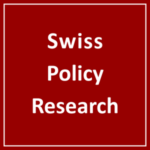 Swiss Policy Research, founded in 2016, is an independent, nonpartisan and nonprofit research group investigating geopolitical propaganda in Swiss and international media. SPR is composed of independent academics that for personal and professional reasons prefer to protect their identities, and receives no external funding; there are no financial sponsors or backers. Our articles have been published or shared by numerous independent media outlets and journalists, among them Julian Assange, and have been translated into more than two dozen languages.
Swiss Policy Research, founded in 2016, is an independent, nonpartisan and nonprofit research group investigating geopolitical propaganda in Swiss and international media. SPR is composed of independent academics that for personal and professional reasons prefer to protect their identities, and receives no external funding; there are no financial sponsors or backers. Our articles have been published or shared by numerous independent media outlets and journalists, among them Julian Assange, and have been translated into more than two dozen languages.
Tags: Alternative Media, BBC, Corporate Media, Investigative Journalism, Mainstream Media MSM, Media, Media empire, Military Industrial Media Complex, Propaganda, Social media, War Journalism, Yellow Journalism
DISCLAIMER: The statements, views and opinions expressed in pieces republished here are solely those of the authors and do not necessarily represent those of TMS. In accordance with title 17 U.S.C. section 107, this material is distributed without profit to those who have expressed a prior interest in receiving the included information for research and educational purposes. TMS has no affiliation whatsoever with the originator of this article nor is TMS endorsed or sponsored by the originator. “GO TO ORIGINAL” links are provided as a convenience to our readers and allow for verification of authenticity. However, as originating pages are often updated by their originating host sites, the versions posted may not match the versions our readers view when clicking the “GO TO ORIGINAL” links. This site contains copyrighted material the use of which has not always been specifically authorized by the copyright owner. We are making such material available in our efforts to advance understanding of environmental, political, human rights, economic, democracy, scientific, and social justice issues, etc. We believe this constitutes a ‘fair use’ of any such copyrighted material as provided for in section 107 of the US Copyright Law. In accordance with Title 17 U.S.C. Section 107, the material on this site is distributed without profit to those who have expressed a prior interest in receiving the included information for research and educational purposes. For more information go to: http://www.law.cornell.edu/uscode/17/107.shtml. If you wish to use copyrighted material from this site for purposes of your own that go beyond ‘fair use’, you must obtain permission from the copyright owner.
Read more
Click here to go to the current weekly digest or pick another article:
EXPOSURES - EXPOSÉS:
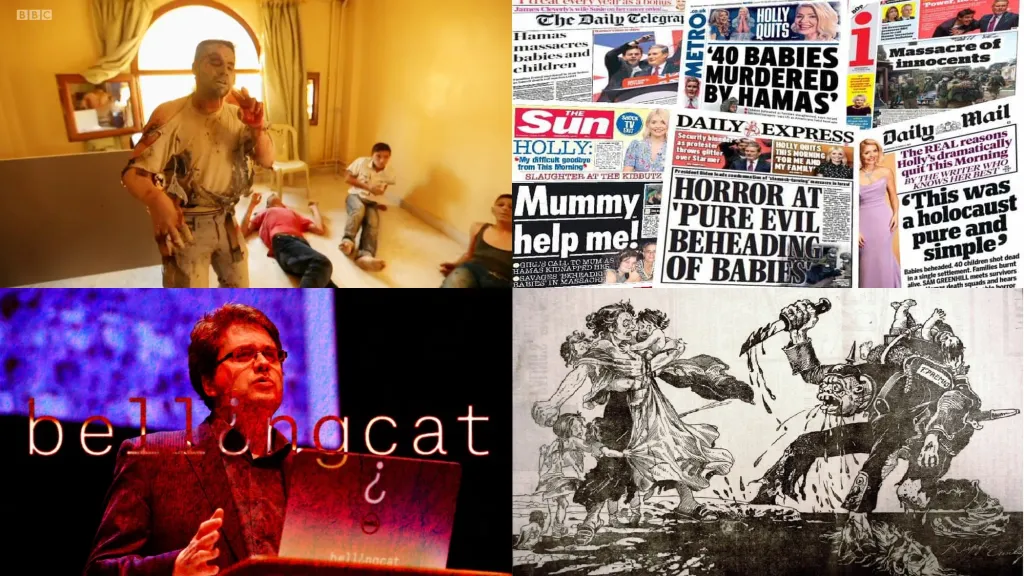
 Tony Blair, Lord Jacob Rothschild, Israeli ambassador Mark Regev, and Israel lobbyist Trevor Chinn (2018)
Tony Blair, Lord Jacob Rothschild, Israeli ambassador Mark Regev, and Israel lobbyist Trevor Chinn (2018)